RV Fire Cause and Prevention webpage is written by a seasoned RV'er of 50 years, which is also a Mechanical Engineer that practiced NFPA fire suppression engineering.
Instructions: Subjects are listed on left. Click the link to the right to go directly to the subject matter on this page.
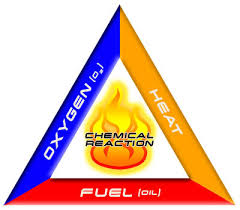
We want to begin our discussion by talking about the familiar 'fire triangle'. The fire triangle has the three ingredients necessary to create a fire. Just like making a cake, if one ingredient is left out, the cake will not be a cake.
The ingredients are the outer bars that make up the triangle, fuel, heat, and oxygen. A fire cannot start without all ingredients, and a fire cannot keep burning without all ingredients. Therefore, to prevent a fire one just needs to make sure that one of the ingredients is not present. Or, to put out a fire remove one ingredient. Following we will discuss the three ingredients relating to your RV and how to avoid putting them all together at once.
Fire prevention is better than fire fighting. But, fire fighting skills are essential because fires are a reality. At ARP Control we make a very specific product that helps with fire prevention for RV refrigerators, the Fridge Defend. For all your other RV fire needs we recommend Mac the Fire Guy.
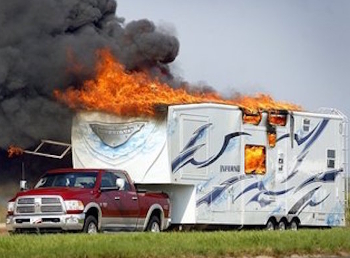
On average there are approximately 4000[1] RV fires per year. It is reported that the number two cause of a fire is the RV refrigerator[2]. The number one cause of fire is reported to be within the RV engine compartment, often in the electrical system. Most RVs are made with a wood frame that burns easily, it is reported that an RV can burn to the ground in about 10 minutes. Never enter a burning RV! Some insulation and plastics used to make an RV are toxic when they burn, they will knock you out if you breath the fumes. The following discussion will address RV refrigerators and then other sources of fires.
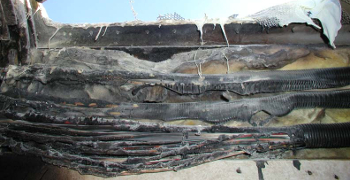
There are many items that can result in a refrigerator fire. As mentioned above, poor wiring can result in a fire that can be blamed on the fridge cooling unit. This photo shows where an RV manufacture routed wires through the fridge cooling unit compartment. Because the fridge cooling unit rejects heat, the heat on the wires can result in problems.
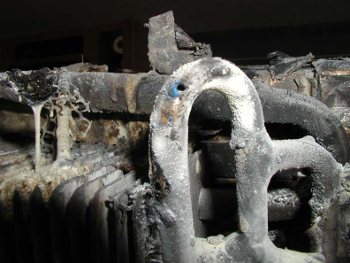
As seen in this photo, the wires in the photo above dropped down and shorted on the fridge cooling unit. The result was to blow a hole in the cooling unit and a fire followed. Going back to the fire triangle, the wire short circuit made a hole in the cooling unit and provided ignition (heat), when the flammable contents (fuel) in the cooling unit came in contact with the air (oxygen) the fire started.
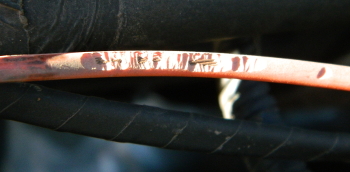
Also, lack of maintenance such as checking the refrigeration cooling unit compartment for rodent and insect nests can pose a fire hazard. The best way to prevent the aforesaid conditions is to either inspect your fridge often, or have a qualified RV tech preform a safety inspection at least once a year. This photo shows where a field mouse chewed through the insulation of a wire in the cooling unit compartment. A visual inspection is one of the best ways to prevent a fire, if you see something wrong, fix it.
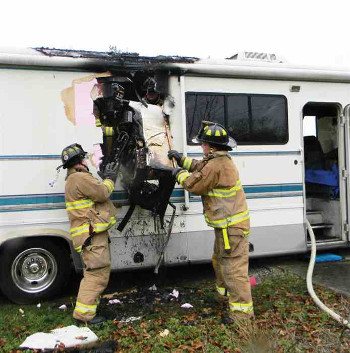
As mentioned by Chris Bloom[3], a fire investigator, off-level operation of the fridge damages the fridge which can result in a fire hazard, as stated in the Bloom article "This is the responsibility of the owner or operator of the RV". When the aforesaid article was written, it was believed that the fridge could be safely operated during driving. But, the the inventor of the Fridge Defend by ARP has come to find that this is not entirely true. With extensive testing of RV refrigerators in transit it was found that climbing grades of 2 degrees or greater can result in damage to the fridge, it must be noted that there are many factors that affect how and when the fridge is damaged. These factors are ambient temperatures, wind conditions, the duration of climbing a grade, just to mention a few.
Click here for news article about Motorhome destroyed in refrigerator fire.
For further reading on this subject, and how the Fridge Defend by ARP solves these issues please click on the following links:
Most antifreeze is Ethylene Glycol, when a leak in the engine cooling system occurs the water will boil off first because water has a lower boiling point than Ethylene Glycol. Water boils at 212degF (100degC) and Ethylene Glycol boils at 387degF (197degC)[4]. The auto-ignition temperature of Ethylene Glycol is 770degF (410degC), where auto-ignition is the lowest temperature at which Ethylene Glycol will spontaneously ignites in normal atmosphere without an external source of ignition, such as a flame or spark. Exhaust gas (more on this subject below) can reach 1200degF (649degC), thus antifreeze leaks can be a fire hazard.
Antifreeze has a strong order, it is described as a sweet smell. If while driving a sudden odor occurs, pull over, turn off your engine and open the hood to inspect for leaks. We recommended that each time one stops for fuel, the engine oil level is checked and a visual inspection under the hood is preformed.
Generally, if there is an antifreeze leak, the coloring agent (green, pink, yellow) will be evident around the leak with a fuzzy white powder. Naturally, keep an eye on your engine temperature gage, following are some tips:
If you see a sudden drop of engine temperature, this means there is a problem! The coolant (antifreeze) level has dropped below the engine temperature sensor due to a leak, because your engine is running cool does not mean everything is OK.
If your engine temperature starts climbing, try slowing down. Climbing hills requires more energy, therefore your cooling system has to work harder. If your cooling system is in need of maintenance, the temperature can start climbing when going up hills, again, driving slower will help cool the engine and save fuel.
Finlay, Ethylene Glycol is much less viscous (1.61 x 10^−2 N*s/m^2) than water (1.002 x 10^-3 N*s/m^2), what does this mean? If the Ethylene Glycol and water mixture is not correct in your cooling system, two problems can occur. First, due to the viscosity difference, if there is too much Ethylene Glycol in the mixture, leaks will occur in the cooling system that would not occur with the proper mixture. FYI, want to find a small leak in the cooling system? Put straight antifreeze in the cooling system :) The second issue is that if there is too much Ethylene Glycol in the cooling system, the engine runs hotter because pure water transfers heat much better than Ethylene Glycol. If you are having overheating problems, flush the cooling system and make sure the correct mixture of antifreeze to distilled water is used.
Batteries are a very big subject, we will cover some basics here, more is included in the following Electrical System section. Because batteries store a lot of energy, they have the ability to start fires if not handled properly. Batteries have to be maintained properly, the type of maintenance depends on the type of batteries you have. Batteries should always be housed in a compartment vented to the outside of the RV. When charging or discharging, batteries can give off hydrogen gas which is explosive. Thus, never disconnect a battery that is under a load. Turn off all load sources before disconnecting the battery terminals.
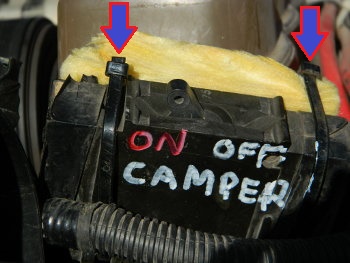
The RV electrical system is the most likely cause of a fire. And with our experience installing the Fridge Defend by ARP, we understand why. Automotive wiring is subject to vibration, thus the wires can rub and short, in addition wire connectors can fall off. We see many RVs where household twist on "wire nuts" are used. Wire nuts are fine for a house that only vibrates when the earth shakes, but on a vehicle the vibration causes the wire nuts to loosen and fall off leaving bare wires that can short. Further, wire nuts are for solid type wire such as used in a residence. Stranded wire is needed in vehicles because of the vibration, stranded wire does not hold the wire nut properly. If you see wire nuts on your RV, consider replacing them with a better type of connector. On the other hand, crimp type connectors should not be used on solid type wire, crimp connectors are preferred on all stranded wire. If a connection needs to be made between a stranded wire and a solid type wire, screw terminals are a good choice.
The image above shows a circuit breaker mounted near the battery.
The arrows show wire ties securing the circuit breaker.
In addition, insulation was used to keep the engine components from overheating
the circuit breaker.
( Please click on this link for more on RV Circuit Breakers )
Crimping wire is an art, even folks that have crimped wires all of there life can make a bad crimp connection. It is recommended that one does not twist up the stranded wire before crimping, this can be a matter of personal preference. When I insert a crimp connector on a wire, before I remove the crimp tool from the connector, I use the tool to tug on the connection to see if I can pull the connector off of the wire. It is much better to redo a crimp connection than to troubleshoot an electrical system that has a bad crimp connector in it.
It is best to use a little more wire when wiring a vehicle than not enough. Many times I have found wires that shorted because the wire was too tight, there was not enough room for the wire to bend and flex as needed. Vehicles are dynamic, they bend and flex, if the wire is pulled tight it looks neat, but it is prone to failure. Use a little extra wire and tie the wire down with nylon wire ties (see image rv-circuit-breaker.jpg above). The nylon wire tie may not need to be tightened down so that the wire does not move, form a loop so that the wire can move within the wire tie, discretion is needed here because some wires should not be allowed to move within the wire tie.
We strongly
recommend replacing any non-GFI receptacles in your RV with
GFI type. Some folks in the RV industry are against the use of GFI type
protection due to the fact that the GFI can trip resulting in added work
for individuals solving problems. We at ARPC LLC feel that the safety far
out weighs any disadvantage.
RV GFI and Fridge Heater Fire
Engine fuel lines can be very dangerous. Gasoline fuel injection that has rubber lines needs to have the fuel lines replaced as soon as they show signs of deterioration. A fuel leak fire can be very bad because so much fuel can be deposited that the fire is hard to put out. Fuel pressures vary by manufacture and type of engine. An older vehicle with a carburetor will have 3-8psi of fuel pressure, where as older fuel injected gasoline engines will have fuel pressure in the range of 35-65psi. If there is any evidence of a fuel leak, try and fix the problem immediately.
Exhaust leaks are usually easy to hear, thus they are vary apparent. The exhaust manifolds and the exhaust gas are the hottest engine parts under the hood. Exhaust gas can reach in excess of 1200degF when the vehicle is climbing a hill, thus an exhaust gas leak can start a fire very easily. If an exhaust leak develops, the best thing to do is determine if there are any combustibles in the vicinity of the leak. If it is determined that there is no danger of fire, drive slowly to a location where the problem can be fixed.
Kitchen appliances in an RV should never be left unattended while hot. Because the kitchen in an RV is often small, it can be easy to leave a bottle of cooking oil open, and then spill it on an open flame on a stove top creating a fire in an instant. For this reason, use great caution in an RV kitchen. Try and keep combustibles away from the stove top, and always keep the oven empty. We know of an RV fire that started when an individual stored paper plates in the oven, and then started the oven forgetting that a combustible was in the oven.
Any oil leak, be it hydraulic, engine, transmission, or drive axle should be dealt with immediately. Slow leaks will accumulate dust and dirt, as a result a thick layer of fuel to start a fire builds up. All oil leaks are an indication of a failure, if leaks are allowed, very expensive repairs will follow.
Please click here to see our LP Safety Video
Liquid Propane (LP) is very safe when installed and used correctly. NFPA has distinct rules
regarding its use in automotive applications. One issue that arises is improper filling of
bottles. This issue has been mostly solved by the new style fill valves that are to prevent
over filling of the LP bottle. Regardless, it is best to have your LP bottle filled by
a knowable attendant.
We always open our LP bottle 1/4 turn of the valve, this way if there is a fire,
it is fast and easy to turn off the LP gas. The LP should always be stored so that
the bottle is vented to the outside. This is because all pressure vessels have
pressure relief valves (PRV). If the LP bottle is over filled, and the temperature rises,
the PRV can open and vent the LP bottle. If the LP bottle cannot vent to the outside of the
RV, an explosive mixture can build up within the RV. One final comment on the PRV, some think
that the LP bottle can explode if there is an RV fire, this is not true as long as the PRV works.
The PRV is a safety valve designed to prevent the aforesaid situation. But, when the PRV vents
any fire will become much larger, get a safe distance away from the vehicle and let
professionals that are trained to fight fires deal with the situation.
As is stated above, always inspect rubber LP hoses for weathering. Replace hoses that show
aging, whenever working on LP gas lines, mix up some dish soap and use it to bubble
test the pressurized line. If there is a leak, bubbles will appear. Usually, leaks can be fixed
by turning off the LP tank, loosen the connection and re-tighten the connection. Then bubble check
again.
It is important to have the LP gas pressure checked annually, if your gas pressure is not
correct the fridge and other appliances will not work correctly. Also, bubble check the LP regulator
vent, if the diaphragm in the regulator fails, gas will leak and this can also result in a fire.
The repair and maintenance of LP is an extensive subject, we are just giving a brief
overview here. We strongly advise you have a qualified tech work on LP if
you do not feel qualified.
Tires can cause fires if one runs the pressure low. This is because the sidewall of the tire flexes and cause friction in the tire. The best suggestion we can give, get a tire pressure monitoring system. The next best thing to do is us an IR temperature sensor gun to read the tire temperature every time you stop. If you see a high tire temperature reading, check the air pressure in that tire. Duals are a problem, if the inside dual is low on air, it is difficult to tell by looking at the tire. A low inside dual tire is the cause of many tire fires. Finally, an old truck driver trick is to use a mallet to hit the tire, a low tire makes a different noise than a full tire.
The author's of this article are Paul and Mao Unmack. Paul and Mao are both Professional Engineers and have a great deal of experience in design safety. Mao's Engineering Masters Degree is in Welding Engineering. Her area of expertise is thermodynamic analysis and pressure vessel design. She designed ammonia pressure vessels for fertilizer production plants. RV refrigerators are defined as a "fired pressure vessel". In addition, the welds on the RV fridge are an aria of failure. Mao's Professional Engineering license is for machine design.
Paul worked as both a diesel and an automotive mechanic before receiving his Mechanical Engineering degree. His automotive expertise is engine management and control systems. As a Mechanical Engineer Paul practiced NFPA fire protection design. NFPA 1192[5] is the minimum criteria for RV fire and life safety design. Paul practiced plant control systems engineering, and this is what his Professional Engineering license is for.
All of the information on this page is curtsy or our willingness to help promote safety. None of this information is considered professional advice. If any errors or improvements are deemed necessary, immediately bring them to the attention of the author's using the Contact Us form found in the top and bottom menus.
[1] U.S. Vehicle Fire Trends & Patterns, NFPA 2004 ed.
[2] Fire & Life Safety Training Seminar, FMCA.
[3] RV Refrigerator Compartment Fires, Chris Bloom, 2006.
[4] Wiki Ethylene Glycol.
[5] NFPA 1192, Section 1.2, 2004 ed.